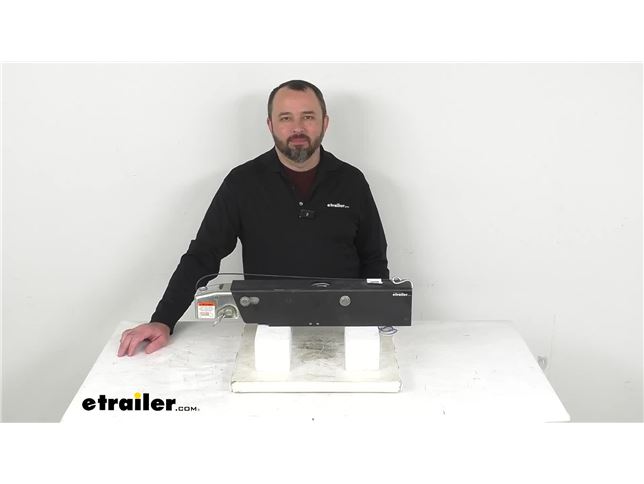Dexter DX7.5L A-60XL Surge Brake Actuator w Electric Lockout - Disc - 2" Ball - Primed - 7.5K
- All Info
- Reviews (26)
- Q & A (0)
- Videos (1)
- Photos
Dexter Brake Actuator - DX69FR
- Surge Brake Actuator
- Disc Brakes
- 2 Inch Ball Coupler
- 7500 lbs GTW
- Weld-On
- Farm Trailer
- Boat Trailer
- Construction Trailer
- Travel Trailer
- Utility Trailer
- Electric Lockout
- Dexter
- 3 Inch Channel Tongue
For years, this UFP-style surge brake actuator has been the gold standard for boat trailers. Its weld-on, low-profile design looks sleek on your trailer. Manual lockout pin and fill cap sold separately. Made in the USA.
Features:
- Activates your trailer's disc brakes when your tow vehicle slows or stops - no brake controller needed
- Lets you back up without locking up your trailer brakes
- Electric reverse lockout keeps your trailer brakes from activating when your reverse lights come on
- Manual lockout pin (DX94FR - sold separately) lets you manually lock out the brakes if you tow with a truck that only has a 4-way
- Creates a sleek look with its low-profile design
- Coupler latch sits flush with the actuator's body
- Provides you with a reliable, secure connection
- Latch mechanism only engages when the hitch ball is fully seated
- Safety pin keeps the socket closed around the ball, even if the latch pops up
- Resists rust and corrosion
- Aluminum master cylinder is rustproof, unlike cast steel ones
- Fill cap (T097-022-00 - sold separately) prevents fluid contamination
- Includes breakaway cable with S-hook
- Welds onto your trailer tongue
- Primed finish is easy to weld and paint
- Certified by the SAE for safe, reliable operation
- Made in the USA
Specs:
- Application: trailers with hydraulic disc brakes
- Ball size: 2"
- Mounting: 3" x 3" or 3" x 4" straight tongue
- Gross towing weight: 7,500 lbs
- Dimensions: 19" long x 4-3/16" tall
- 2-Year limited warranty
Tech Tip: If you really just need to replace the inner member of your old actuator and you're confident that you can salvage the outer casing, you can purchase DX99FR instead.
UFP by Dexter: New Name, Same Great Actuator
If you're replacing your old actuator, you're probably looking at this one and thinking, yeah, that looks like mine alright, but doesn't UFP make these? The short answer is that Dexter bought out Unique Functional Parts (UFP) in 2013, changed the name, but kept the awesome design. Rest assured, this is the real deal and not some kind of knockoff.
Back Up a Boat Trailer Easily with an Electric Reverse Lockout
Elelctric reverse lockouts can be summarized in one word: convenient. If you're looking for an actuator that lets you "set it and forget it", this one from Dexter could be a great option for you.

The solenoid on this electric lockout ties into the reverse light circuit on your 5-pin, 6-pin, or 7-pole connector so that your disc brakes won't engage when your reverse lights come on. This can make backing up a boat trailer so much easier than using a manual lockout because everything is automatic.
Simple, Secure Connection
Trigger latches on traditional couplers can be kind of a pain to work with sometimes.


For starters, you have to hold the latch up as you lower the coupler onto the hitch ball. Not to mention that the latch can stick out like a sore thumb, so it may get bent or broken by your tailgate or your bumper as you go to hitch up. That's more than just an inconvenience; when your coupler is out of commission, your trailer's not going anywhere with you.


The coupler on this UFP-style actuator negates all of that. Just slide the button on top with your thumb while you lift up the latch handle. Then, place the coupler over the center of your hitch ball and lower your trailer with your tongue jack.
When you can close the latch without forcing it, you'll hear a click. This sound tells you that the ball is seated firmly inside. Then, just re-insert the tethered safety pin, hook up your safety chains and your breakaway cable, and you'll be ready to tow.
How Does a Surge Brake Actuator Work?
When you slow to a stop as you're towing, momentum pushes your trailer toward the rear of your vehicle. When this happens, the surge brake actuator compresses the master cylinder inside, which forces it to push hydraulic fluid out to your brake lines, ultimately engaging your trailer brakes. When you start moving again, the actuator will telescope back out, stopping the flow of fluid back to the brakes and allowing your trailer's wheels to start rolling again.
099-060-22 Dexter DX7.5L Brake Actuator w/ Electric Lockout - Disc - 2" Ball - Primed - 7,500 lbs
Replaces UFP Model A-60 Marine Surge Brake Actuator


Videos are provided as a guide only. Refer to manufacturer installation instructions and specs for complete information.
Video Transcript for Review of Dexter Brake Actuator - Surge Brake Actuator Electric Lockout - DX69FR
Hi, everybody, Andy here with etrailer.com. Let's take a look at this Dexter surge brake actuator with electric lockout. Now, this UFP-style surge brake actuator has been the gold standard for bow trailers for years. It's weld-on, low profile design looks sleek on your trailer. This is designed to fit onto your two-inch hitch ball and it has a 7,500 pound weight capacity. This is going to fit your three inch by three inch or three inch by four inch straight tongue.
And as you probably know, this actuator will synchronize your trailer brakes with your tow vehicle brakes and this hydraulic actuator will activate your trailer brakes when your tow vehicle slows or stops. When you apply the brakes in your tow vehicle, deceleration occurs and the momentum will push your trailer towards the rear of your vehicle. So with this surge brake system, this actuator is then triggered as your trailer moves forward while the tow vehicle slows down. The inner portion will telescope back, which applies force to the master cylinder in the back. And then that will in turn supply the necessary hydraulic pressure to engage your trailer's disc brakes.
So as I mentioned, this does feature a low profile coupler latch that's going to ensure an easy, secure connection. As you might know, some brake actuators have a very tall latch when you go to hook up and that could be damaged from something coming over the top of the trailer and hitting it and bending it and breaking it. This one, this latch is all internal, so there's nothing sticking up. And this is over the center latch mechanism, which will only engage when the actuator is fully seated on a two inch hitch ball. And I do happen to have one here.
I just want to give you a brief demonstration of how this is gonna be. So, it's gonna be easy to hook up. So I'm gonna go ahead and pull this pin out first. The pin is tethered with the cable here. And then, I'm just going to move this knob to the left here and then flip that open.
And that's going to allow me to then couple on my two-inch ball and then just go ahead and close that. And then now, I am coupled on that ball. And then, I'm gonna go ahead and replace this pin. And this is, again, a safety pin. So even if this happens to pop open the ball is still going to stay secured in place. So that pin's going to make sure of that. But then when you're ready to uncouple, you'll just remove the pin and then slide this up and then you'll just be able to easily uncouple from that ball just like that. And I'm gonna go ahead and push that down and replace the pin. So very easy to hook up and it's going to be a very secure connection for you. Now, this does include, as you probably saw here, this breakaway cable. And so you're gonna take this hook and the cable on it and hook this to your tow vehicle. So if by some chance this becomes unhooked from the ball, this cable will pull and actuate the brake cylinder back here to apply the brake. So it's going to prevent a runaway situation. This also features an electric reverse lockout solenoid. So you'll be able to back up without actuating your trailer brakes. The electric reverse lockout on this actuator is automatically activated when you shift your tow vehicle in reverse. And the solenoid wires that we have right here, they're going to wire into your trailer connector, which then connects to your tow vehicle, and then it can detect when you are in reverse. So when your vehicle goes in reverse, the solenoid's going to ensure that the hydraulic actuator does not activate your trailer brakes that's allowing you to back up your vehicle. Now, to use this solenoid, you must have either a five-way, a six-way, or a seven-way trailer connector. So five-way flat, six-way round, or a seven-way trailer connector. But a manual lockout pin is available. It's sold separately from this, and that's going to let you manually lock out the brakes if you tow your truck with only a four-way. So on your screen, I am including the part number for that lockout pin, and I do happen to have one here, just to show you what this is going to look like. So if you're only towing with a four-way flat, you will need this pin. And then the master cylinder here, lemme go ahead and you actually really can't see the master cylinder itself, but it's on the inside here. That master cylinder is constructed of aluminium rather than plastic or steel. So that's gonna give you increased strength and corrosion resistance. And you can see that you'll just fill the brake fluid there. Now, a fill cap is available, which, again, is sold separately. And that's gonna help prevent fluid contamination. And so I happen to have that part here as well, just to show you what this is going to look like. And if you decide to pick one of these up, you'll just put this on top here and then that's just going to lock into place just like that. So if you are going to need one of those, I do have the part number there. Those part numbers, as you probably know, can just be popped into the search field of our website. And then that will take you to that part that you're looking for. So this does have a prime finish to it. This is a black finish, as you can see here. So this is gonna be very easy to weld and then paint. And then in case you were wondering, I wanna measure the outside portion here. So putting my tape measure there, as you can see, we're right at 19 inches long. And then looking at the pipe, we're sitting about 4 3/16 inches tall. This is certified by the SAE for safe, reliable operation. I think that's gonna wrap up our look today. I do hope that it was helpful for you. Again, my name is Andy. Thank you for joining me.
Customer Satisfaction Score:
97% were satisfied with this product
3% of customers were not satisfied
- Wrong item was ordered
Ratings & Reviews
4.9
26 reviews
Easy to install and a perfect fit.
Part received fast and already installed. Works great
Ashley was great to work with promptly processed the order and received it in 2 days great service
I have not got it on the trailer yet can't wait to use it it looks awesome hope it works as good as it looks
Nice product
Great service getting the rite parts
Just what I wanted. I am building a custom trailer for my vintage boat. I have used these actuators in past projects. etrailer has great pricing and fast delivery every time.
Perfect replacement for the same item that wore our after 12 years of use. Simple install. Remove the old actuator - unhook the brake line (which I was afraid would leak, but doesn't,) unhook the blue wire from the solenoid, pull the two pins, and pull it out. Reverse the process to install the new one.
Only question was, where does the white wire on the new unit go? Old unit did not have a white wire. Answer is that it's a ground, so just find a ground and hook it up.
Of course, you must now bleed the air out of the lines, but anyone who is tackling this job themselves has probably bled brakes before.
PS. I bought this unit, which comes with the primed steel outside piece, because it was cheaper than buying the internal unit by itself.
It was exactly what I needed for my MASTERCRAFT boat trailer. I pulled the old one out and slid the new one in. Very easy to do

Bought this for my 1995 Mastercraft Boat trailer. Works great, wasn't worth rebuilding the 30 year old unit. The solenoid to disable the brakes when backing up is awesome!
See what our Experts say about this Dexter Brake Actuator
- What is Difference Between Dexter DX7.5L DX69FR and DX43FRHey Stephen, this is a great question but I don't have a great answer. Both of our part numbers # DX69FR and # DX43FR represent the same exact Dexter DX7.5L A-60XL Surge Brake Actuator. I am not sure why we have two part numbers for the same thing at this time.
view full answer... - Replacement Disc Brake Actuator Hey Keith do you have any part numbers off of that actuator? Also how does yours attach to your trailer's tongue? The Dexter DX7.5L A-60XL Surge Brake Actuator item # DX69FR, you were looking at is for disc brakes. This one welds to a 3" wide tongue. You can add this information and any other questions you have where it says Reply to Jerred H and I'll be happy to answer them. If you want to send pics feel free to send them to the email address you receive this response from.
view full answer... - Replacement Inner Member for a A-75 Disc Brake ActuatorHey Carey, thanks for the information. It sounds like you need the Replacement Inner Member for Dexter DX7.5L Actuator item # DX99FR. The A-"number" was for the weight capacity of the coupler; an A-60 was rated for 6K and an A-75 was rated for 7,500 lbs. In the recent past Dexter consolidated everything to be rated for 7.5K so the item # DX99FR will work and fit. What kind of boat do you have?
view full answer...
Do you have a question about this Brake Actuator?
Info for this part was:






At etrailer we provide the best information available about the products we sell. We take the quality of our information seriously so that you can get the right part the first time. Let us know if anything is missing or if you have any questions.






































Thank you! Your comment has been submitted successfully. You should be able to view your question/comment here within a few days.
Error submitting comment. Please try again momentarily.